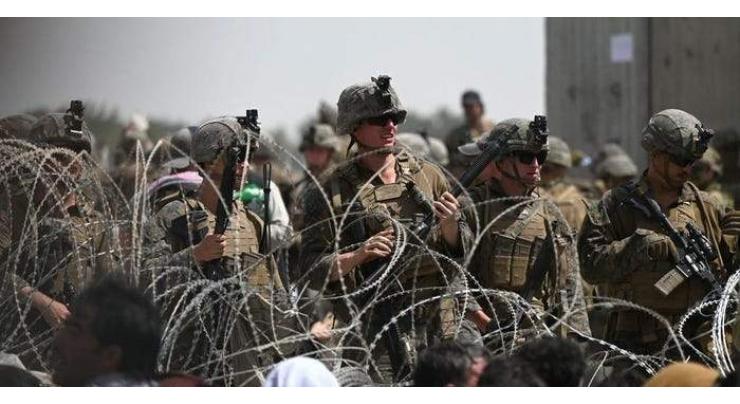
Tragedy In Kabul Turns West's 'Right Of Interference' Into Political Fiasco
Muhammad Irfan Published August 27, 2021 | 09:34 PM

A series of terrorist attacks outside the Kabul airport which killed 13 American soldiers and over 150 Afghans, just days before the allied forces were to conclude a hectic evacuation from the militant-controlled country, have proved the total collapse of the West's "right of interference" in other countries, experts told Sputnik
BRUSSELS (UrduPoint News / Sputnik - 27th August, 2021) A series of terrorist attacks outside the Kabul airport which killed 13 American soldiers and over 150 Afghans, just days before the allied forces were to conclude a hectic evacuation from the militant-controlled country, have proved the total collapse of the West's "right of interference" in other countries, experts told Sputnik.
The tragedy, which unfolded in Kabul on Thursday, became the deadliest attack on US forces in Afghanistan in a decade. While Republicans are calling for the US president's resignation and possible impeachment, even some Democrats are trying to distance themselves from the President.
Hours after several explosions rocked Kabul airport and its outskirts, Biden vowed to hunt down the leaders of the Islamic State-Khorasan terrorist group (IS-K, banned in Russia), which claimed responsibility for the suicide attacks.
"We will respond with force and precision, at our time, at the place we choose and at the moment of our choosing," he said. At the same time, the president remained steadfast in his commitment to withdraw American forces from Afghanistan after the twenty year long mission by the August 31 deadline.
White House spokeswoman Jen Psaki confirmed during a press briefing that Biden did not need additional congressional authority to unilaterally order the US military to strike IS-K.
RIGHT OF INTERFERENCE: JUSTIFIED OR NOT?
According to professor Michel Liegeois of Belgium's University of Louvain, Afghanistan, as well as the West's other attempts to intervene in conflicts across the world, reaffirm that the concept of humanitarian intervention "has lost ground in the last few years."
The presence of Western forces did not prevent the killing of 800,000 people in Rwanda in 1994, nor 8,000 in Bosnia and Herzegovina in 1995, the professor said.
"This supports the idea that any such operations must be vetted by the United Nations that must give the mandate to specific countries to come to the rescue of populations or a country in a limited and specific issue.
In the case of Libya, non-aligned countries such as India had given their reluctant support. They got burned by it, and the window of opportunity of the 'Right of interference' becomes narrower and narrower," Liegeois added.
Armin-Paulus Hampel, foreign policy spokesman for the Alternative for Germany (AfD) group in the German parliament, shared a similar view.
"Believing that the Western powers have the right to interfere into countries against their will, such as was the case in Libya, Syria and Mali, or tomorrow in the Maghreb countries or Eritrea, if they are not called by the legal government or without a mandate from the United Nations, is totally wrong. We may criticize but not interfere," Hampel told Sputnik.
According to Liegeois, Western interference in Afghanistan supported a corrupt regime in the country.
"It did not succeed in organizing the Afghan police or the army. The real question is to know if the human rights standards of the West are applicable as such in a country like Afghanistan, and how long it would take," the professor said.
According to the AfD foreign policy spokesman, the US and its NATO allies made "many wrong decisions in Kabul," including by supporting Afghan warlords who stole funds provided to the country.
"The hope now is that the international community; Russia, China, the US and the Europeans negotiate with the Taliban [a terrorist group, banned in Russia] ... The Taliban will be receptive and it will be cheaper than to take hundreds of thousands of Afghans to Germany and put them on the German welfare system," Hampel explained.
The politician added that the US and NATO were not mandated to enter Afghanistan and, therefore, "the operation failed."
Related Topics
Recent Stories

Mired in crisis, Boeing reports another loss

Session Awarding Ceremony 2024 held at Cadet College Muzaffarabad

Austrian ski great Hirscher to make comeback under Dutch flag

Pakistan, Japan agrees to convene 'Economic Policy Dialogue'

FM Dar conveys deepest sympathy on torrential rains devastation in UAE

Spain PM Sanchez says weighing resignation after wife's graft probe

Tennis: ATP/WTA Madrid Open results - 1st update

Long-lost Klimt portrait auctioned off for 30 mn euros

Osaka seals first win on clay since 2022 in Madrid

Earthquake jolts Karachi

Sindh minister orders operation after attack on police in Ghotki

TikTok to fight US ban law in courts
More Stories From World
-
Football: English Championship table
2 hours ago -
Time for 'democratic transition' in Venezuela: opposition candidate to AFP
3 hours ago -
Spain's Pedro Sanchez : a risk-taker with a flair for survival
3 hours ago -
Football: French Ligue 1 table
3 hours ago -
Nadal will only play French Open if he can 'compete well'
3 hours ago -
Ukraine, Israel, TikTok: the massive aid package before US Congress
3 hours ago
-
TikTok to fight US ban law in courts
4 hours ago -
Football: French Ligue 1 results
4 hours ago -

Spain PM Sanchez says weighing resignation after wife's graft probe
5 hours ago -

Long-lost Klimt portrait auctioned off for 30 mn euros
5 hours ago -

TikTok to fight US ban law in courts
5 hours ago -

Anger among Ukrainians in Poland as Kyiv halts passport renewals
5 hours ago



